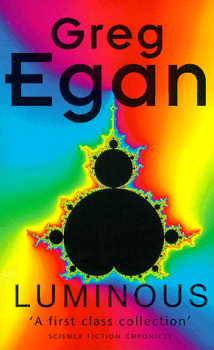Diaspora
![]()
![]()
Click here to read the book's blurb
 |
Up until reading Diaspora, I'd neatly categorised Greg Egan into 'Genetic engineering' and 'Post-cyberpunk metacomputation' (my phrase; do you like it?). To some extent, Diaspora falls into both categories - Egan can't be failed for expounding on new novel forms of life or the possibilities of simulating systems, and in this novel he combines the two, with new novel forms of life being simulated on other new novel forms of life.
To this, he adds a healthy dose of hard-physics-SF.
It seems fashionable these days for hard-SF authors to think up ever more grand galaxy, universe and metaverse spanning sagas. At first I read Asimov and Clarke - travelling between planets, let alone stars was good enough for me. I received a sharp shock after reading Baxter's Xeelee Universe series, where I was introduced to the complexities of four dimensional hyperspheres and hypercubes, time travel and inter-universe travel. Egan's Permutation City sent my head spinning with its self-assembling simulations lying upon self-assembling simulations.
But Diaspora... well, Diaspora attempts to out-do them all. It starts off small (that's small in a relative sense) with a description of life in a Polis - basically, a computer running simulations of human beings at extremely fast speeds. For those of you who are going to write off these simulations as not really being sentient, think about it - a sufficiently detailed simulation is not actually simulating the human being - it actually is a copy of the human being.
In this not-too-distant future (only a thousand years from now, would you credit it) there exist two other human 'forms' of life - Gleisner robots, which are essentially immortal androids simulating human beings, and Fleshers.
The Gleisner robots are different from the Polis-dwellers in two important ways. Firstly, they have to interact with the physical world - there's no flying about in cyberspace for them. Secondly, they run at 'real time' - in other words, they live at the same speed as normal humans, or 'Fleshers'. Polis-dwellers, on the other hand, live subjectively thousands of times faster than 'Fleshers'. So one second for a Flesher would be about over a thousand seconds for a Polis-dweller.
Got that?
Because that's the easy bit.
Early in the novel, Gleisner researchers discover that two binary neutron stars, that weren't due to collide for, well, a long time, are about to collide in four days. So, in four days time, the solar system would be hit by a gamma-ray burster. This wouldn't affect the Polis dwellers, since their computers that run them are buried far underground, but it'd pretty much kill off all the Fleshers, due to the intense radiation. The Gleisners, being robots, would be able to rough it out.
So the Polis dwellers go and warn the Fleshers.
To avoid summarising the whole story, the Gleisners decide to take jaunt off to the source of the gamma-ray bursters to found out what's going on since they blew up so early, and check out some of the closer stars with planets. Not to be left out, the Polis dwellers go and clone their programs and send off essentially computers with sensors and manufacturing systems to loads of stars as well. They find all sorts of weird and wonderful life forms, and it wouldn't be a true Greg Egan book if they didn't find some kind of life form that was a 'simulation' - which they do.
Eventually, they come across a 'strange' planet (go and read the book yourself!), and find a way to travel to other universes. From there on, with talk of 5 physical dimensions, the whole book is reduced to incomprehensible physics and universe hopping, and I basically lost the plot.
Well, no, I didn't, but I thought it got a little boring after that. That's not to say the Polis dwellers don't have any adventures - of course they do. But the latter part of the book didn't do much for me. I don't know what all this fuss of universe hopping is about - Stephen Baxter used in in Time, and it didn't do anything for me there, either. In my unprofessional and ignorant opinion, universe hopping should be only used sparingly, not as some sort of plot device (Baxter used it to great effect in his Xeelee Universe series)
So, that's the book. But is it any good? you ask.
In a manner of speaking, I suppose. If you like Greg Egan books, the more abstract novels that deal with ideas and physics, yes, you'll like this. If you want good characterisation, people you can identify with and a plot with a strong sense of direction, you will not like this at all. The plot goes all over the shop, and it's anticlimatic in places.
The start of the book itself is a little strange, and I wasn't sure whether it was a good idea for Greg to begin with such an abstract set of ideas - it took a while for me to get my head around exactly what was going on. After the first chapter though, the book gets into a good stride.
The problem, though, is that Greg has split Diaspora into several 'acts', each involving slightly different people. It's a good way of encompassing a large timeline and showing all the points of view, but it means that you never really identify with any of the characters - and that's hard enough when you're dealing with people who are bits of software code.
All in all, Diaspora was a good effort to show the reader a vast epic involving incredible new paradigms of life (simulations, simulations of simulations ad infinitum), but it just wasn't quite good enough.
Greg Egan has written some other excellent stuff though - Luminous, his collection of short stories, is brilliant, and Permutation City isn't too bad either.
(BTW: It's pronounced 'Di-aspora', not 'Diyah-spora')

